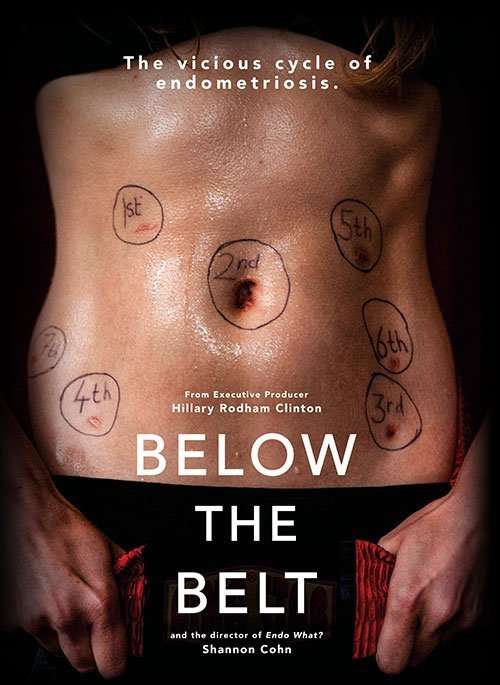Endometriosis, its complications, and its misdiagnosis are the focus of a new PBS documentary, Below the Belt.
Best estimates suggest endometriosis affects as many as 11 percent of women in the U.S. and more than 200 million worldwide. But misdiagnosis is rampant, taking an average of ten years before effective treatment, and it’s the focus of a new PBS documentary, Below the Belt.
The documentary, directed by Shannon Cohn, follows the struggle of four individuals seeking treatment for endometriosis — the condition causes tissue resembling the uterine lining to grow outside of the uterus, often causing intense menstrual pain, heavy bleeding, and fertility challenges. The film is backed by heavyweights in women’s rights issues including Hilary Rodham Clinton and Rosario Dawson.
The disease has been at the heart of medical gaslighting claims for years. Celebrities including Gabrielle Union, Padma Lakshmi, Halsey, Lena Dunham, Daisy Ridley, Jessica Williams, and Amy Schumer, have all spoken out about their struggles with the disease.
“Imagine suffering from a chronic health condition, day in and day out, only to have your symptoms minimized or pushed to the side,” Christine N. Metz, Ph.D wrote in an op-ed in U.S. News and World Report in 2021. “Unfortunately, this experience is all too common for women across the nation who have endometriosis. Now is the time to stop that behavior, demand better care from physicians and health care providers, and take control.”
Sufferers of the condition typically spend years in and out of specialists’ offices, and often find themselves being told the pain is in their head or being overexaggerated. Funding for research into endometriosis lags behind other conditions with similar rates of affliction.
Cohn says all of that, plus her own experience with the disease, motivated her to make the film.
“Endometriosis is a disease rooted in taboo and stigma and bias,” Cohn told Ms. Magazine. “Traditionally, women’s health conditions have not been given the attention they deserve. They’ve been historically underfunded and under-researched, so we don’t have the answers that we need.”
Dr. Iris Kerin Orbuch, who features prominently in the film, says endometriosis education for medical students and gynecologists is “woefully inadequate.”
“Most gynecologists don’t even know the varying symptoms of endometriosis,” Orbuch told Ethos via email. “They don’t know that endometriosis can cause pain throughout the month, pain prior to one’s period, as well as pain occurring after one’s period, or mid-cycle, or any time of the month.”
What causes endometriosis isn’t entirely clear, but Orbuch says there is a significant genetic link. “For instance, if the mom or aunt or sibling has endometriosis, the affected newborn has a sevent to ten-fold risk of getting endometriosis (a 70-100 percent likelihood of developing the disease),” she says.
Currently, surgery is the gold standard at diagnosing endometriosis, but Orbuch says not everyone will undergo surgery. “Many who undergo surgery are misdiagnosed because many gynecologists do not know the various appearances of endometriosis.”
Orbuch says the disease causes symptoms across various organ systems beyond the gynecological — gastroenterological, urological, as well as overall general systems, can be impacted, and the disease can cause fatigue and exhaustion. “Most doctors don’t know that endometriosis causes constipation, diarrhea, painful bowel movements, and bloating. Those with endometriosis often see a gastroenterologist, and are diagnosed with irritable bowel syndrome,” Orbuch says.
The film says common prescriptions of hormonal contraceptives used to suppress the cycle and alleviate symptoms often fall short of treating the disease itself. Orbuch says these medications often fail to eliminate endometriosis and may induce undesirable side effects such as brittle teeth, hot flashes, and exacerbated PMS symptoms.

Many doctors have suggested hysterectomies and even pregnancy could cure endometriosis — both of those theories are refuted in the documentary. More than 100,000 hysterectomies are performed annually for the disease already.
Pregnancy is also a challenge for endometriosis sufferers; the disease is responsible for up to half of all infertility cases, distorting pelvic anatomy, inducing scarring, altering the hormonal environment, and compromising immune system function. The documentary also challenges the commonly used surgical approach — ablation, which often leaves hidden tissue undisturbed.
According to Orbuch, most gynecologists are trained to perform the wrong surgery, (ablation or burning of endometriosis). “This is the type of surgery I learned how to do in my residency. It was only when I did a fellowship, I was trained how to perform excision of endometriosis,” she says.
Cohn makes the case for excision surgery where lesions and adjacent tissue are entirely removed. This method, however, requires specialist surgeons, often not covered by health insurance, leading to significant out-of-pocket expenses for patients.
“It is so painful, watching those affected by endometriosis suffer in silence,” Orbuch says. “Those with endometriosis often see an average of eight physicians over a course of a decade until they are diagnosed. Then once they’re finally diagnosed most undergo the wrong surgery. (The correct surgery being excision of endometriosis.)”
Orbuch suffers from endometriosis herself, and says she was gaslit for 16 years by the medical industry. “No one should go through even six months of pain, let alone the nearly decade long delay in diagnosis.”
Below the Belt is streaming on PBS.
Related on Ethos:


